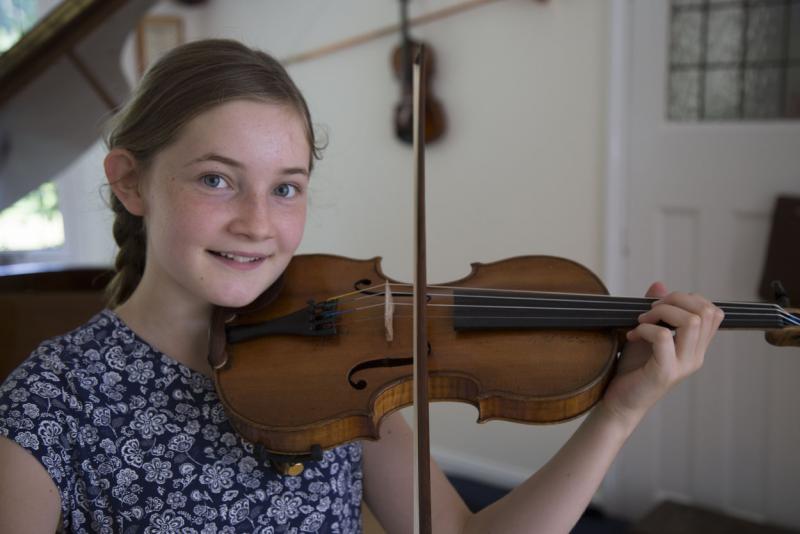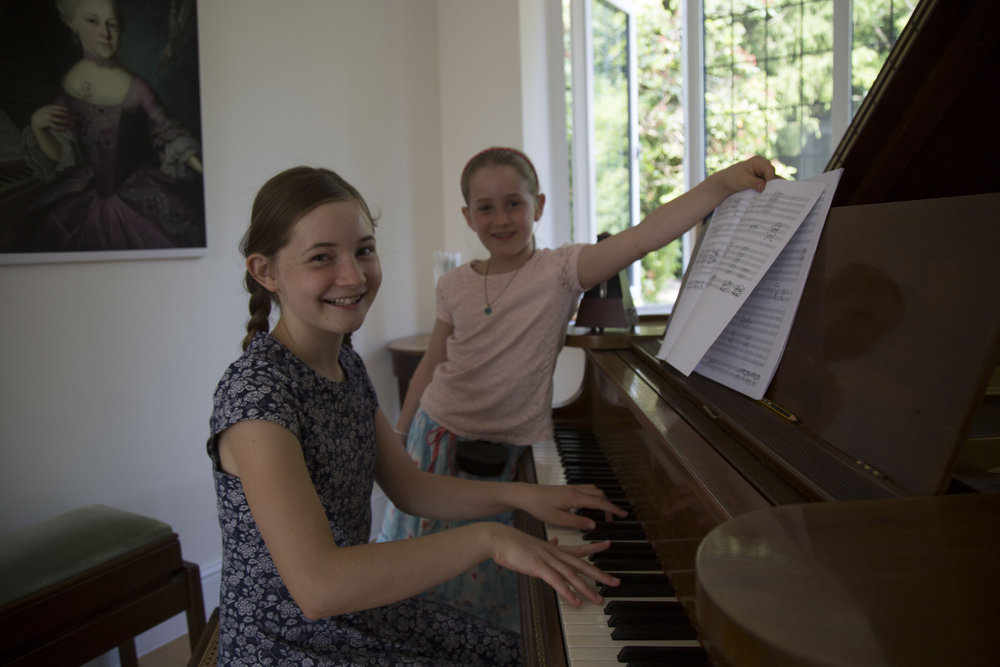Imagine Alma Deutscher: Finding Cinderella, BBC One review - beguiling profile of a musical prodigy | reviews, news & interviews
Imagine... Alma Deutscher: Finding Cinderella, BBC One review - beguiling profile of a musical prodigy
Imagine... Alma Deutscher: Finding Cinderella, BBC One review - beguiling profile of a musical prodigy
When your first full-length opera is premiering in Vienna - and you are only 11

Morag Tinto’s documentary is a profile of composer Alma Deutscher, who hit the headlines at the end of last year when her opera based on the Cinderella story premiered in
Alma is the real deal; frighteningly talented but disarmingly likeable. We see her at the family home in Surrey, the footage intercut with the final rehearsals and performance of the opera. Her linguist father has been filming Alma’s musical development since she was six, and shows host Alan Yentob clips of her at work, the pencil seemingly unable to keep up with the flurry of ideas which fill her head. At times, the fast-talking Alma seems baffled by her facility: “It’s a mystery… melodies just pop into my head.” Yentob is visibly flummoxed when Alma cheerfully improvises on four notes he plucks at random from a hat. You wonder whether the parents will turn out to be the villains of the piece, but they’re remarkably level-headed. Alma and her younger sister Helen (pictured below, with Alma) are home-educated, but that’s only after Alma returned home upset on the first day of primary school, complaining that she’d not learned enough. On the basis of what we see, Alma does enjoy a happy enough existence. She plays in a treehouse and flits around the garden, twirling a glittery skipping rope which functions as a talisman. So, is Alma’s music any good? Cynics might point out that it sounds like technically brilliant pastiche, the work of a supernaturally gifted student who has listened to lots of Mozart and Schubert. But the ease with which Alma inhabits the idiom is phenomenal, and it’s clear that she understands instinctively the nuts and bolts of how music works. The most touching sequence comes near the close, with Alma and her sister duetting on a pair of violins once owned by Mozart. Such a shame that this enjoyable film was broadcast so late on a Monday night: luckily it can be seen on iPlayer. We watch Alma during rehearsals for Cinderella. She’s thrilled to hear her material in context, giggling that “it sounds even better than when I think about it,” after one aria. She’s her own repetiteur, with Helen as page-turner. When conductor and orchestra arrive, Alma immediately queries bassoon parts and alters tempi, instructing her players with crystalline precision. Bryn Terfel and Sir Simon Rattle chip in, both awed by Alma’s gifts but stressing that she needs to develop at her pace, in her own time. Rattle shrewdly points out that, “It won’t always flow so easily… but we’ll all be there for her when it gets hard.”
We watch Alma during rehearsals for Cinderella. She’s thrilled to hear her material in context, giggling that “it sounds even better than when I think about it,” after one aria. She’s her own repetiteur, with Helen as page-turner. When conductor and orchestra arrive, Alma immediately queries bassoon parts and alters tempi, instructing her players with crystalline precision. Bryn Terfel and Sir Simon Rattle chip in, both awed by Alma’s gifts but stressing that she needs to develop at her pace, in her own time. Rattle shrewdly points out that, “It won’t always flow so easily… but we’ll all be there for her when it gets hard.”
Add comment
The future of Arts Journalism
You can stop theartsdesk.com closing!
We urgently need financing to survive. Our fundraising drive has thus far raised £49,000 but we need to reach £100,000 or we will be forced to close. Please contribute here: https://gofund.me/c3f6033d
And if you can forward this information to anyone who might assist, we’d be grateful.

Subscribe to theartsdesk.com
Thank you for continuing to read our work on theartsdesk.com. For unlimited access to every article in its entirety, including our archive of more than 15,000 pieces, we're asking for £5 per month or £40 per year. We feel it's a very good deal, and hope you do too.
To take a subscription now simply click here.
And if you're looking for that extra gift for a friend or family member, why not treat them to a theartsdesk.com gift subscription?
more TV
 Hostage, Netflix review - entente not-too-cordiale
Suranne Jones and Julie Delpy cross swords in confused political drama
Hostage, Netflix review - entente not-too-cordiale
Suranne Jones and Julie Delpy cross swords in confused political drama
 In Flight, Channel 4 review - drugs, thugs and Bulgarian gangsters
Katherine Kelly's flight attendant is battling a sea of troubles
In Flight, Channel 4 review - drugs, thugs and Bulgarian gangsters
Katherine Kelly's flight attendant is battling a sea of troubles
 Alien: Earth, Disney+ review - was this interstellar journey really necessary?
Noah Hawley's lavish sci-fi series brings Ridley Scott's monster back home
Alien: Earth, Disney+ review - was this interstellar journey really necessary?
Noah Hawley's lavish sci-fi series brings Ridley Scott's monster back home
 The Count of Monte Cristo, U&Drama review - silly telly for the silly season
Umpteenth incarnation of the Alexandre Dumas novel is no better than it should be
The Count of Monte Cristo, U&Drama review - silly telly for the silly season
Umpteenth incarnation of the Alexandre Dumas novel is no better than it should be
 The Narrow Road to the Deep North, BBC One review - love, death and hell on the Burma railway
Richard Flanagan's prize-winning novel becomes a gruelling TV series
The Narrow Road to the Deep North, BBC One review - love, death and hell on the Burma railway
Richard Flanagan's prize-winning novel becomes a gruelling TV series
 The Waterfront, Netflix review - fish, drugs and rock'n'roll
Kevin Williamson's Carolinas crime saga makes addictive viewing
The Waterfront, Netflix review - fish, drugs and rock'n'roll
Kevin Williamson's Carolinas crime saga makes addictive viewing
 theartsdesk Q&A: writer and actor Mark Gatiss on 'Bookish'
The multi-talented performer ponders storytelling, crime and retiring to run a bookshop
theartsdesk Q&A: writer and actor Mark Gatiss on 'Bookish'
The multi-talented performer ponders storytelling, crime and retiring to run a bookshop
 Ballard, Prime Video review - there's something rotten in the LAPD
Persuasive dramatisation of Michael Connelly's female detective
Ballard, Prime Video review - there's something rotten in the LAPD
Persuasive dramatisation of Michael Connelly's female detective
 Bookish, U&Alibi review - sleuthing and skulduggery in a bomb-battered London
Mark Gatiss's crime drama mixes period atmosphere with crafty clues
Bookish, U&Alibi review - sleuthing and skulduggery in a bomb-battered London
Mark Gatiss's crime drama mixes period atmosphere with crafty clues
 Too Much, Netflix - a romcom that's oversexed, and over here
Lena Dunham's new series presents an England it's often hard to recognise
Too Much, Netflix - a romcom that's oversexed, and over here
Lena Dunham's new series presents an England it's often hard to recognise
 Insomnia, Channel 5 review - a chronicle of deaths foretold
Sarah Pinborough's psychological thriller is cluttered but compelling
Insomnia, Channel 5 review - a chronicle of deaths foretold
Sarah Pinborough's psychological thriller is cluttered but compelling
 Live Aid at 40: When Rock'n'Roll Took on the World, BBC Two review - how Bob Geldof led pop's battle against Ethiopian famine
When wackily-dressed pop stars banded together to give a little help to the helpless
Live Aid at 40: When Rock'n'Roll Took on the World, BBC Two review - how Bob Geldof led pop's battle against Ethiopian famine
When wackily-dressed pop stars banded together to give a little help to the helpless

Comments
'Home-educated, but that’s
Based on other interviews I
I firmly believe Alma's
Well, actually one has to see